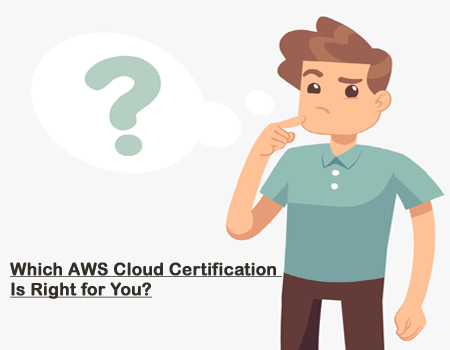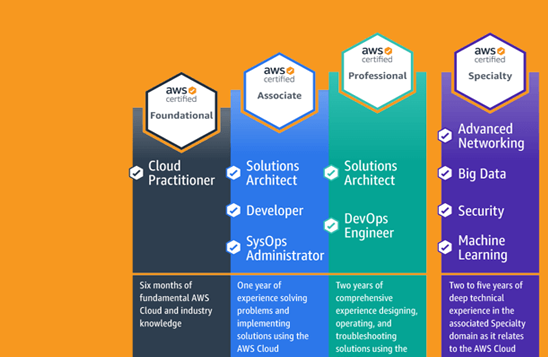
It sound’s great if you’re thinking about getting AWS certified. The demand for Cloud computing skills are huge, and whether you’re looking to take your career to the next level or jump into a new field, getting the right certification can help you open the door to some life-changing opportunities.
But the first question which comes in mind is “Where do you begin”? AWS offers ten individual certifications, which are divided into four different levels. Figuring out where to start, and which AWS certification is right for you and your career goals, can seem daunting task at first. Fortunately, once you figure out what’s what, the path usually becomes pretty clear.
Now just a look at the different certifications offered by Amazon Web Services. As of 2019, there are ten different certifications, spread across four experience levels – Foundation, Associate, Professional, and Specialty.
Exploring the various AWS Certifications.

AWS Foundational Level Certifications
For AWS, Foundational certification is a starting point. Since there is only one certification at the foundational level, this certification covers foundational cloud concepts and how AWS works at a high level.
Prerequisites: None
Recommended Experience: 6 months of AWS and industry knowledge.
AWS Certified Cloud Practitioner –Foundational
The AWS Cloud Practitioner certification gives you a high-level introduction to AWS. It doesn’t go deep into any particular services, instead it gives a general overview of how AWS is structured.
The AWS Certified Cloud Practitioner exam is perfect for those who want a certification that covers a general knowledge of the AWS platform and it is the best place to start for anyone who’s new to cloud computing.
AWS Certified Solutions Architect – Associate
The AWS Certified Solutions Architect – Associate certification gives you a broad overview of AWS, and help you know how to build and deploy systems in the AWS cloud. In this course we will start with a broad overview of the AWS platform and then deep dive into the individual elements of the AWS platform. You will explore Identity and Access Management (IAM), EC2, S3, Cloud Front, Auto scaling, Load Balancing, RDS, RedShift, Virtual Private Cloud (VPC) etc. That’s the reason it’s been the #1 cloud certification for four years running.
AWS Certified Developer – Associate
Just because it has “Developer” in it doesn’t mean it is only for developers but it’s really for anyone who uses AWS.
AWS Certified Developer – Associate cetification focus into services like Dynamo DB, Elastic Beanstalk, SQS, and SNS, but not too deep. It also expects you to know a bit more about how you would use these services, as well as how they present themselves to the outside world through APIs and SDKs.
Prerequisites: AWS requires that you have at least a year of experience maintaining applications in the AWS cloud to take this exam. You should also have insights about the core services, principles, and best practices associated with services on the AWS platform, and have some experience creating applications for tools like Amazon DynamoDB, AWS Elastic Beanstalk, AWS CloudFormation.
AWS Certified SysOps Administrator – Associate
Going through this certification it requires rather in-depth knowledge on CloudWatch and gives you a much stronger grasp of what’s actually going on in your AWS. This exam is designed to certify your ability to deploy, manage, and operate system resources in the AWS cloud. You should have a firm understanding of what it takes to manage said systems for both fault tolerance and high availability.
Prerequisites: The AWS SysOps Associate certification training program is designed for systems administrators who have at least one year experience in managing or building applications in the cloud.
AWS Certified Solutions Architect – Professional
AWS Certified Solutions Architect – Professional is the apex of general AWS expertise and you’ll need to show that you not only know how to build and deploy distributed systems in the AWS cloud to spec, but also that you understand how to deploy them at scale with fault tolerance and high availability.
For the Solutions Architect – Professional each and every service in the entire AWS ecosystem is in play and requires an in-depth knowledge in specific areas like security and Direct Connect.
Prerequisites: You must hold an AWS Certified Solutions Architect—associate certification to take this exam. AWS also recommends more than two years comprehensive experience deploying distributed systems, at scale, using AWS cloud services based on design requirements and best practices.
AWS Certified DevOps Engineer – Professional
This certification requires you to have a technical expertise in provisioning, operating, and managing distributed application systems on the AWS platform. As in any good DevOps exam, you can expect to face questions about continuous integration and continuous delivery (CI/CD) methodologies. Including best practices for automating security and compliance checks. You’ll also need to show a working knowledge of monitoring and logging practices as they pertain to the AWS platform.
Prerequisites: You must have cleared an AWS Certified Developer—associate or AWS Certified SysOps Administrator—associate to take this exam. You’ll need at least two years delivering applications in or managing AWS cloud deployments, and some experience with automation best practices, including scripting or other programming.
AWS Specialty Certifications
Certifications
AWS Certified Advanced Networking – Specialty
AWS Certified Big Data – Specialty
AWS Certified Security – Specialty
AWS Certified Machine Learning – Specialty
Prerequisites: Two to five years of hands-on experience and advanced knowledge of AWS in the specific specialty area.
AWS Certified Big Data—specialty
The AWS Certified Big Data Specialty Exam is one of the most diificult certification exam you can take from Amazon. It is all about showing that you know how to use various AWS services to get most out your data analysis.
This certification exam goes extremely deep on all the data services, especially RedShift, Kinesis, DynamoDB, and Elastic MapReduce along with focus on the narrow areas – specifically networking, big data, security, and machine learning.
AWS Certified Advanced Networking – Specialty
The advanced networking certification digs into complex networking, especially networking that spans scalable AWS systems, and includes aspects such as multi-region setups and cost optimization. This exam will ask you to show that you can manage a network architecture for any service on the AWS platform and that you can automate your networking tasks.
This course covers everything about certain services like Direct Connect, Border Gateway Protocol (BGP), and routing.
AWS Certified Security – Specialty
This certifications is all about advanced methods for securing the AWS platform. This course go into depth on a number of security-specific services, such as Identity and Access Management (IAM), Virtual Private Cloud (VPC), Key Management Service (KMS), CloudTrail, AWS Config, and Web Application Firewall (WAF).
This certification enables tenured cloud security professional to demonstrate their ability to secure the AWS cloud.
AWS Certified Machine Learning – Specialty
AWS Certified Machine Learning – Specialty certification is the newest AWS certification. This course requires you to have deep and broad knowledge of SageMaker and AWS’s other machine learning services, including Recognition, Translate, Polly, and Comprehend. You’ll need to know how to process big data using Kinesis, S3, Glue, and Athena. And you’ll need a strong knowledge of AWS security, including use of KMS and IAM.
Which AWS certification is right for you?
So there are total ten certifications (for now), which are divided into multiple levels and discipline areas. So it depends like, if you’re the sort who just has to collect them all, to have more power. But what if you’re following a more focused track, or looking for a change in career into cloud computing? What certifications should you go after?
Among the ten certifications, even one certification has the potential to be life-changing. It can open the door to new opportunities. But it’s up to you to take those opportunities and run with them.
Given that, it’s a good idea to go for the three AWS Associate certifications to gain a really solid foundation for using AWS effectively, day-to-day. With these, you’ll understand how to design, build, configure, monitor, and maintain systems built on AWS.
If you’re just getting started in the cloud, AWS Certified Cloud Practitioner and Certified Solutions Architect – Associate are the best way to go. But determining the right ultimately comes down to your circumstances and career goals.
- Apache Lucene Query Example - April 8, 2024
- Google Cloud: Step by Step Tutorials for setting up Multi-cluster Ingress (MCI) - April 7, 2024
- What is Multi-cluster Ingress (MCI) - April 7, 2024

